
“The patent system secured to the inventor for a limited time exclusive use of his inventions. It thereby added the fuel of interest to the fire of genius in the discovery and production of new and useful things.” – Abraham Lincoln, American statesman, lawyer, and the 16th president of the United States
Hi there, people! I hope you had an excellent start with the winters this year. Today, I was thinking of making you more familiar with the INVENT@IITGN programme at IIT Gandhinagar. The first of its kind in India, this initiative has gained immense popularity in a small span of just two years. In July, I did a short piece highlighting the history and some novel and compelling aspects of this programme. But, since Winter is Coming, I thought it would be a great idea if I could help you dig deeper into the adventurous journeys of its participants. Not only will it be interesting and educative, but inspirational and motivating as well. What better way than to start with their inventions in brief!
So, here we go!
June 2018 saw the beginning of this six-week inventing and patenting initiative for the first time in the country. After a competitive evaluation of 80+ applications, 20 students from 5 IITs across India were selected to compete in 10 teams for the first, second, and third prizes of Rs. 2 Lakh, Rs. 1 Lakh and Rs. 50 thousand, respectively. All participants received a stipend of Rs. 10 thousand for the successful completion of this initiative. They filed the Indian and U.S. patent applications for each of these inventions.
Yash Sharma and Haque Farazul from IIT Kharagpur invented the Irrigation, Weeding, and Pest Control Device winning the Best Invention award. Being an inexpensive and simple tool, it equips the farmers with efficient deep root irrigation, weed, and pest control for their crops.
IIT Gandhinagar’s Kratika Bhaktani and Kartik Karvaje secured the position of the Second Best Invention with their Manual CPR Device prototype. This inexpensive, portable, and compact mechanical device performs chest compressions at an optimal rate and proper depth, ventilates lungs, maintains an open airway, and indicates the compression rate.
The Third Best Invention prize went to Agrata Patel and Anshuman Dhar from IIT Guwahati. They devised Sleep Easy, a 5-min easy to install blanket on any bed-type. It can prevent injuries encountered by Parkinson’s patients suffering from REM Sleep Behaviour Disorder. It allows regular movements but restricts any violent thrashings utilizing a centrifugal clutch mechanism, commonly found in seat belts.
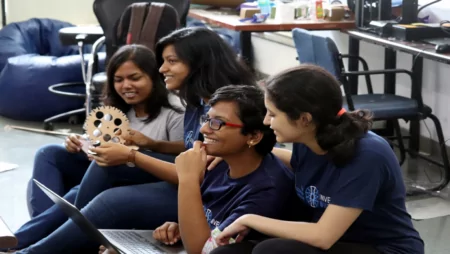
Protect-X, invented by Shubham Nandeshwar from IIT Madras and Tanmaey Gupta from IIT Gandhinagar, is an improved device to minimize the severity of rear underrun vehicular collisions. It helps in reducing the death toll involving cars and similar vehicle collisions with heavy load vehicles like trucks.
Bharath Chandra and Srishal from IIT Gandhinagar developed Load Carrier for labourers. It can significantly reduce the injuries confronted by them while carrying heavy loads on their backs.
IIT Guwahati’s Tejas Patil and IIT Gandhinagar’s Rohit Singh innovated Fire Free. It is a temperature monitor and an electrical fire preventing adaptor. It pops the plug out in case of temperature rise at the socket junction, hence avoiding the risk of electrical fire accidents.
Portable and Foldable Toilet, designed by Suyash Patidar and Akshat Bansal from IIT Gandhinagar, is a detachable moving toilet. It comes with an oval flushing mechanism that requires the toilet bowl to rotate vertically. It eases waste dumping and hence reduces water usage.
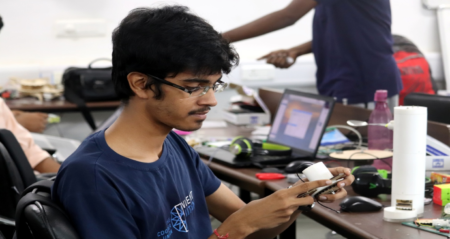
Kuldeep Sharma from IIT Jammu and Vedanta Bhutani from IIT Gandhinagar developed a prototype of the Weeding and Seeding Machine. This cost-effective and less time-consuming device performs intra-row and inter-row weeding and seeding for the farmers.
Invented by Khyati Priya from IIT Guwahati and Birendra Kumar from IIT Madras, the Indoor Navigation System for the Visually Impaired is a lightweight, portable, and inexpensive add-on to a walking stick along with easy-to-install floor patterns and a smart-phone scanning application.
An inexpensive paper bag making machine requiring minimal training, Paper Pop by IIT Kharagpur’s Devang Singhi and IIT Gandhinagar’s Udit Relan, is an effort towards curbing plastic pollution.
After the tremendous responses from its first year, INVENT@IITGN returned with version 2.0 in the summer of 2019. This time, 28 students in 14 teams from 9 IITs participated in this education-cum-implementation-cum-fun programme.
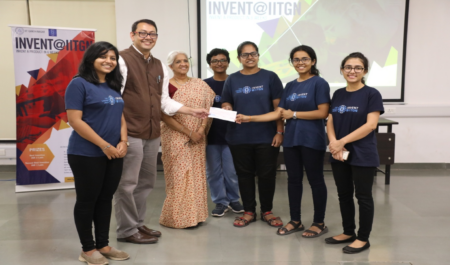
Prabal Vashisht and Parul Sangwan from IIT Palakkad invented the Household Mechanical Solar Tracker winning the Best Invention award. It is a mechanical means to move the rooftop solar panels in the direction of the sun based on an ancient clock technology proven to be inexpensive, precise, and reliable. It increases the efficiency of these panels, overcoming the need for battery systems or motors.
IIT Bombay’s R. Nambilakshmi and IIT Kharagpur’s Prathmesh Deshmukh secured the position of the Second Best Invention with their Leak-proof Eco-friendly Takeaway Container prototype. It takes less storage space before use, is entirely leakage free and fully recyclable after use. A complementary device helps carry these containers securely, eliminating the need for disposable bags.
The Third Best Invention prize went to Samruddhi Pataskar and Kalash Nibjiya from IIT Kharagpur. They devised Spout It, a system that attaches onto the corner of any packet, puncturing it without any spillage. With this arrangement, the user can pour the liquid with ease and store the unused material within the packet securely.
Vacuum Storage Device, invented by Ritesh Ranjan and Saptarshi Sadhu from IIT Kharagpur, is a device for farmer carts. It increases the shelf life of fruits and vegetables without the use of refrigeration.
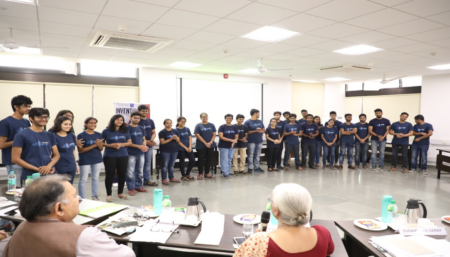
Yash Raj from IIT Dhanbad and Govind V B from IIT Madras developed Diabeto-Care. It is an automatic machine to monitor blood glucose levels and ensure proper insulin dosage for diabetic patients.
IIT Dharwad’s Aman Singhal and IIT Bombay’s Dinesh Jangid innovated Transfer Stool. It is a wheelchair add-on that helps patients transfer themselves from a wheelchair to a toilet or bed.
Sun Protect, designed by Souritra Garai and Jay Shah from IIT Gandhinagar, is a smart sun visor. It improves the driving comfort on sunny days by automatically tracking and blocking the point of the brightest glare.
Arpita Kabra from IIT Gandhinagar and Lipika Gupta from IIT Guwahati developed Med Mind, the prototype of an automatic cognitive monitor and pill dispenser. It tests the cognitive health of patients who may be developing dementia as a part of medicine obtainment.
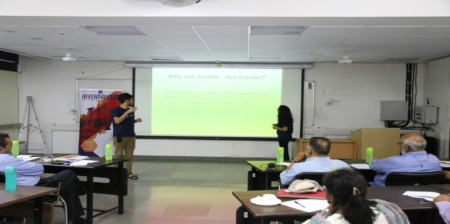
Invented by Anuj Singdi from IIT Madras and Jainam from IIT Gandhinagar, the Easy Carry is a foldable basket for bicycles. Used for carrying things, it stays in a compact form when not in use. It can also be detached and used as a shopping basket.
An inexpensive device to clean reusable sanitary pads, Cleanseright by IIT Goa’s Devyani Maladkar and IIT Bombay’s Aishwarya Agarwal, is a small mechanical washing machine. It combines several simple actions to ensure the effective washing of these pads.
Heal-It, designed by Neha Priolkar from IIT Gandhinagar and Mann Goel from IIT Kharagpur, is a compact device that cleans and seals minor cuts and scratches easily.
Megha Agarwal from IIT Guwahati and Shikhar Prakash from IIT Madras innovated Green Aid. It is an emergency ration for disaster relief. Apart from being used for immediate consumption, it can also provide an ideal environment to sprout seeds and develop yogurt culture.
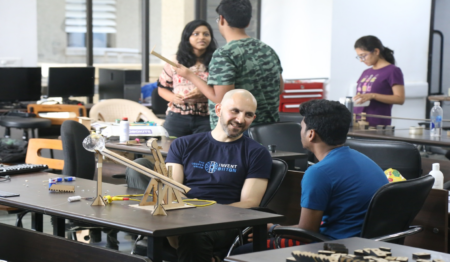
IIT Gandhinagar’s Praveen Venkatesh and Chris Francis came up with Foodbuddy, a voice-controlled system that feeds people with a hand disability.
So, friends, this was all for today! In the summer of 2020, INVENT@IITGN will be returning with its third season comprising of numerous engaging and unique inventions and patents by its student participants. Till then, design, create, innovate, patent, inspire, and stay tuned!
“Innovation is seeing what everybody has seen and thinking what nobody has thought.” – Albert Szent-Györgyi, Hungarian biochemist and Nobel Prize recipient in Physiology or Medicine (1937)
